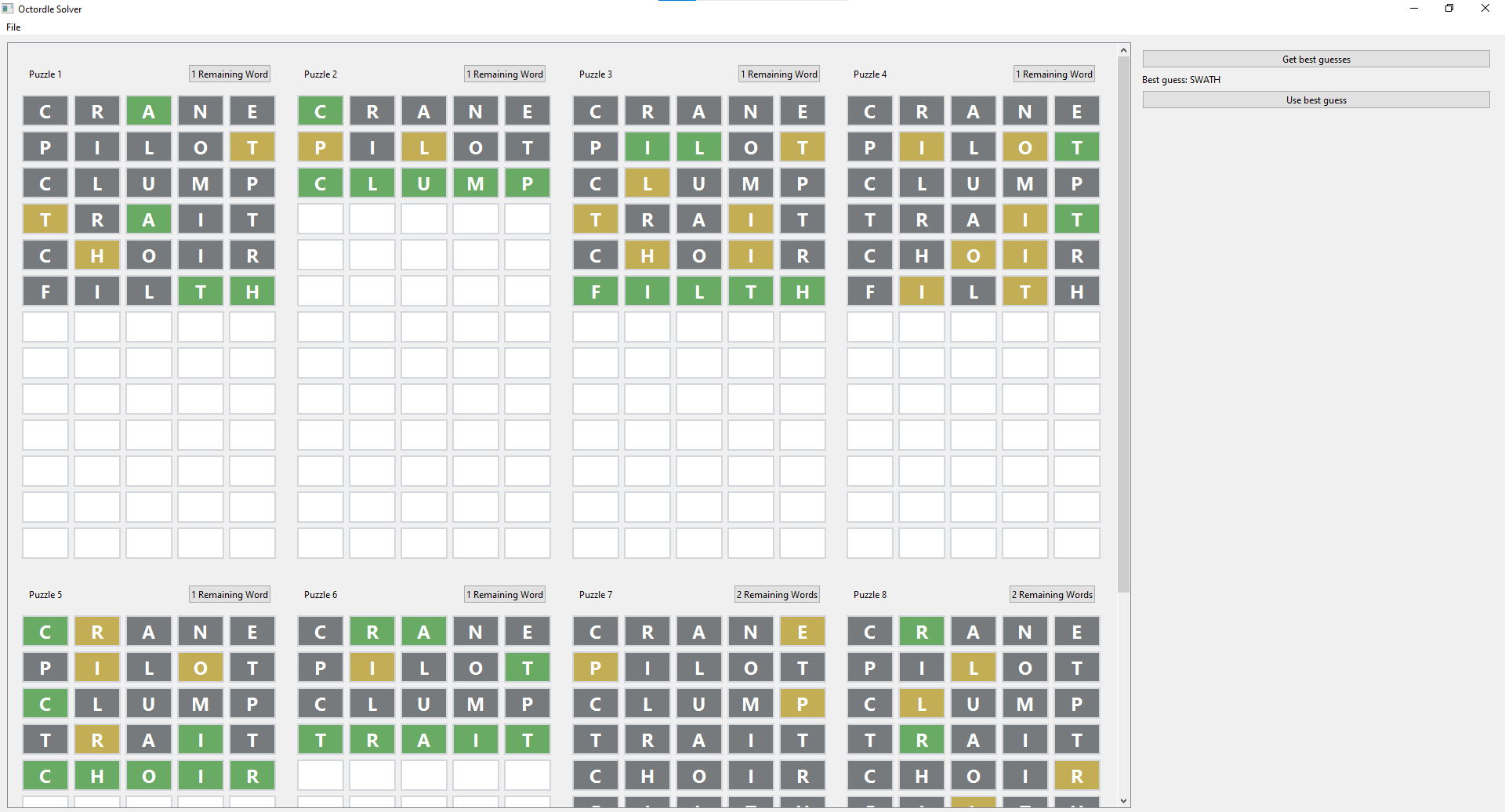Wordle is fun, but Octordle is a different ball game. Some of my coworkers post their results in Slack, and I tried to keep up, but my brain can’t handle that much parallel processing. I’d already built a Wordle solver, so the next logical step was to build an Octordle solver.
On the surface, this seemed pretty straightforward, I already had a working Wordle solver, so it should be pretty straightforward to extend it to several puzzles at the same time. I was able to use a lot of the same logic from the Wordle solver (filtering guesses, generating groups, etc.) but balancing guesses across multiple puzzles required a different approach.
Choosing the best guess across multiple puzzles
The first thing to do it try for the easy wins - if a puzzle is solved or almost solved, prioritize that, then remove it from the pool.
def get_best_guess_multiple_puzzles(puzzles: list[Puzzle]) -> str:
# If only 1 puzzle remains, return its best guess
if len(puzzles) == 1:
return puzzles[0].all_answers[0].word
# If a puzzle can be solved in 1 turn, return that word
for puzzle in puzzles:
if len(puzzle.remaining_words) == 1:
return puzzle.all_answers[0].word
# If a puzzle can be solved in 2 turns, return that word.
# An answer having a max group size of 1 means that guessing that
# word will separate the remaining answers into unique groups
for puzzle in puzzles:
for answer in puzzle.all_answers:
if answer.max_group_size == 1:
return answer.word
Why does max_group_size == 1 guarantee a 2 turn solution? Suppose a puzzle’s remaining possibilities are
CANDY
CANOE
CANAL
If we guess CANDY, the feedback will be unique for each possible answer:
- vs.
CANDY→ 🟩🟩🟩🟩🟩 (solved immediately) - vs.
CANOE→ 🟩🟩🟩⬜🟨 - vs.
CANAL→ 🟩🟩🟩⬜⬜
No two candidates share the same feedback pattern. That means after guessing CANDY, we can tell exactly which word is correct and solve the puzzle on the next turn.
Otherwise, balance across puzzles
When none of the puzzles have a trivial solution, we have to get a guess that is balanced across the rest of the boards.
- Gather all possible guesses
- Assign weights to each puzzle - puzzles with more uncertainty get more sway
- For each candidate word, get a weighted sum of its score across all puzzles
- Pick the word with the highest score
scored_guesses = []
sets = [set(puzzle.all_answers_dict.keys()) for puzzle in puzzles]
all_words = set.union(*sets)
total_remaining_words = sum([len(puzzle.remaining_words) for puzzle in puzzles])
weights = {
puzzle: (total_remaining_words - len(puzzle.remaining_words)) / total_remaining_words for puzzle in puzzles
}
for word in all_words:
total_score = 0.0
for puzzle in puzzles:
answer_possibility = puzzle.all_answers_dict.get(word)
if not answer_possibility:
continue
fitness_score = calculate_fitness_score(answer_possibility, puzzle.remaining_words)
weight = weights[puzzle]
total_score += fitness_score * weight
scored_guesses.append((total_score, word))
best_guess = max(scored_guesses)[1]
return best_guess
Weighting scores helps ensure we don’t waste guesses solving an already-narrow puzzle while ignoring harder ones.
Scoring a guess
Since we’re working with multiple multiple puzzles, we can’t just sort by number of groups anymore, so I went with a scoring/fitness function. Each guess gets a fitness score, which uses some of the same intuition of scoring words for a single puzzle:
- More groups are better - a guess that splits the list of remaining words many ways gives us more information
- Smaller groups are better - we don’t want to be left with a few big groups
- The word being a possible solution is better - there’s a possibility that this is the actual answer, so guessing it might solve a puzzle outright
PENALTY_WEIGHT = 0.1
REMAINING_WORD_BONUS = 2
def calculate_fitness_score(answer_possibility: AnswerPossibility, remaining_words: list[str]) -> float:
fitness = len(answer_possibility.groups) - (answer_possibility.max_group_size * PENALTY_WEIGHT)
in_remaining_words = 1 if answer_possibility.word in remaining_words else 0
remaining_words_bonus = REMAINING_WORD_BONUS * in_remaining_words
fitness += remaining_words_bonus
return fitness
UI
Like the Wordle solver, I made a simple PySide UI to help me input all my guesses. I actually ended up making this really early on, because inputting the guesses on the command line was extremely time consuming and error prone. This was a bit of a different approach, since I normally build out the backend of a tool before the frontend, but I really liked being able to visualize what was going on earlier in the development process, and might be something I try for future projects.

I also added some settings so it can handle any number of Wordle boards with any number of guesses. I tried it against Duotrigordle and it held up, the only limiting factor was my patience in entering in the results from every single guess.
Final result
Before I started on my solver, I tried it by myself. I wasn’t able to beat it, but I got pretty close. I solved my first puzzle in 5 turns, but ultimately ran out of guesses before I finished the last puzzle.
Daily Octordle #863 🔟7️⃣ 🕛5️⃣ 8️⃣9️⃣ 🕚🟥 Score: 76
The solver was able to make much smarter guesses than me, and finished all 8 puzzles much faster, solving the first puzzle in 2 turns, and finishing all puzzles in 10 turns.
Daily Octordle #1277 5️⃣2️⃣ 6️⃣3️⃣ 7️⃣🔟 8️⃣9️⃣ Score: 50
Now I can confidently post my results in Slack and let my coworkers think I’m a genius at Octordle, even though it’s really just some Python code doing all the work.
Next steps
Some things I’d like to improve
- Speed optimizations: While this runs fairly quickly on my gaming PC, Octordle still has a lot of state to evaluate, and there’s definitely room for better caching and pruning.
- Heuristic tuning: The weights, scores, and penalties are all just values I picked by hand, which I could improve with simulations or some kind of reinforcement learning
If you’re interested, the full source code is available here. And if you have any ideas for improvement, I’d love to hear them!
